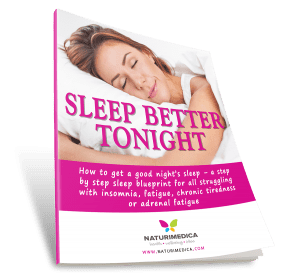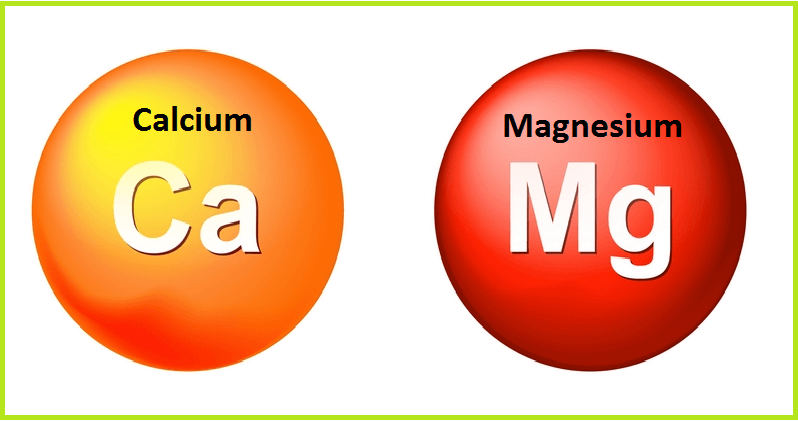There are a number of effective sleep promoting nutrients that support and enhance sleep and relaxation. Calming minerals – magnesium and calcium are my top sleep promoting nutrients. They are effective, relatively safe, and readily available for purchase over the counter from chemists, health food shops or online.
Quality of theses minerals, when supplemented, is the key to getting good results with alleviating insomnia, sleep difficulties or waking up during the night.
MAGNESIUM
Magnesium is a muscle relaxant and a potent inducer of deeper sleep. Most people who suffer from adrenal fatigue are deficient in magnesium as it’s rapidly used by the body under stress.
Circadian rhythms dysregulation also increases magnesium excretion, leading to deficiency.
In my clinical experience, almost everyone needs more magnesium nowadays as our demanding and busy jobs, inadequate nutrition, and compromised lifestyle all contribute to feeling stressed or overwhelmed. That’s why magnesium is usually one of my first suggestion for clients with sleep difficulties.
Take this magnesium deficiency quiz to gauge your current magnesium levels.
Unfortunately, the levels of magnesium in the body are hard to measure and there are no truly reliable tests at present. Therefore, signs and symptoms are the most revealing factors of overall magnesium status.
Sleep-related magnesium deficiency can manifest as:
- Insomnia – it’s one of the main symptoms of magnesium deficiency. Magnesium supplementation has shown positive results in insomnia in a number of studies.
- Agitated sleep, with frequent episodes of waking up during the night.
- Waking up early in the morning with an inability to go back to sleep.
- Restlessness, anxiety and depression.
- Tight muscles and an inability to relax the body and mind.
The best forms of magnesium to help with sleep are magnesium glycinate or bisglacinate (glycine increases magnesium absorption and is also calming itself), citrate (also helps with constipation) and orotate. Formulations that contain a mix of all three forms are also quite effective.
Dose guidelines
Current Australian and U.S. recommended daily allowances (RDA) of magnesium for adults are 400 mg – 420 mg/day for men, and 310 mg – 320 mg/day for women (higher for women who are pregnant or lactating). However, in clinical practice often these intake levels (from diet and supplementation combined) are not sufficient to alleviate sleep difficulties or help with adrenal dysfunction.
Therefore, I often double the intake for a period of time to address the deficiency and then lower the dose to maintain the levels.
Food sources

In addition to supplementation, it’s very important to consume plenty of foods rich in magnesium such as dark leafy greens (very good sources), bananas, nuts (especially almonds), seeds, citrus fruit, ripe tomatoes, cacao and dark chocolate, and whole grains such as rye, barley and quinoa.
Cautions
- Because of the potential for side effects and interactions with medications, you should only take magnesium or any dietary supplements under the supervision of a knowledgeable health care provider.
- Since magnesium is excreted by the kidneys, people with heart or kidney disease should not take magnesium supplements without supervision. Kidney disorders are known to cause magnesium imbalances, as either too much or too little magnesium is excreted.
CALCIUM
Calcium is an important sleep promoting nutrient as it’s necessary for reaching deep sleep cycles, and for the brain to produce the sleep-inducing hormone melatonin.
Calcium works together with magnesium to relax muscles and is sedating to the nerves, therefore it’s often taken at bedtime to induce sleep.
Dose guidelines
Current Australian and U.S. recommended daily allowances (RDA) for adults are 1,000 mg – 1,300 mg for men and 1,000 mg – 1,300 mg for women (higher for women who are pregnant or lactating). The best and safest sources of calcium come from the foods you eat.
It’s important to note that a balanced ratio of calcium and magnesium in the body is essential to overall health, and that these two minerals should be taken together in a 2:1 ratio (twice as much calcium as magnesium) for best results.

Food sources
Organic dairy products (if tolerated), seeds (sesame seeds are high in calcium), bony fish, nuts, legumes and whole grains. For detailed information please check out my free e-book Calcium: best sources of calcium on a dairy-free diet – a detailed guide with recipes.
Foods high in calcium help to boost melatonin levels and thus further support better sleep and rest.
Important: proper calcium absorption from all sources requires the presence of sufficient vitamin D, parathyroid hormone, and small amounts of fat. Therefore, any deficiencies or imbalances of these factors will impact calcium levels.
You can check your vitamin D levels now by completing this self-assessment vitamin D questionnaire.
Summary
Magnesium and calcium are essential minerals for the body to function well and for us to be healthy and well.
They are also important sleep promoting nutrients that are effectively applied to resolve insomnia and other sleep imbalances.
Both minerals are found abundantly in many foods but they are often needed to be taken as supplements as well to address more severe sleep issues.
In my next post, I’ll discuss more of the sleep promoting nutrients including inositol and L-theanine. Stay tuned or even better – subscribe to my blog.
Sleep Better Tonight Blueprint – eBook
If you’re currently suffering from insomnia and/or sleep difficulties, especially if they are related to adrenal fatigue, chronic tiredness, sleep disruptions or insomnia, this sleep blueprint will provide you with the tools to sleep better.
When I was experiencing my own significant sleep problems while suffering from severe adrenal fatigue, I spent time researching and applying various remedies and healing strategies. Since then I’ve helped many of my clients to sleep well again, utilising the following three keys outlined in this step by step guide:
- Key #1:
 Nutrition for better sleep
Nutrition for better sleep - Key #2: Sleep patterns reset
- Key #3: Sleep-promoting nutrients
Your benefits of applying the 3 Keys will include:
- Sounder and uninterrupted sleep, feeling rested and relaxed
- Increased energy and vitality, feeling refreshed and invigorated
- Clearer thinking, feeling calmer and less stressed
What’s included:
- 10+ best foods that really help with sleeping longer and deeper, including foods containing sleep inducing melatonin and serotonin, plus recipes
- Top 4 most effective sleep-promoting nutrients (minerals and other natural compounds) that you can get over the counter, including their food sources and dose guidelines
- Top 6 vital nutrition tips to ensure you sleep better
- Top 5 bedtime snack suggestions
- A step-by-step sleep patterns reset methods and tips
- Adrenal fatigue and sleep issues connection
Let’s get you the sound sleep you need and deserve!
Download your copy of the Sleep Better Tonight: How to get a good night’s sleep – a step-by-step blueprint for all struggling with insomnia, fatigue, chronic tiredness or adrenal fatigue.
Please leave your thoughts and insights by commenting below – but please remember, I can’t offer personal medical advice online, so be sure you focus on sharing your health journey, valuable tips and what you’ve experienced and learnt so far.
What’s your top 2 sleep promoting nutrients?
Good health and blessings
Joanna Sochan
Wholistic Health and Lifestyle Therapist
Natural and Lifestyle Therapies for Abundant Health and Wellbeing
Additional resources
- Top nutrition tips for insomnia and interrupted sleep
- Restless legs syndrome: causes and treatment
- Wake up at the same time every night? Read on!
- Low vitamin D – what you need to know to achieve and maintain high levels
- Online naturopathic consultations Australia
Disclaimer: The above material is for informational and/or educational purposes only. It should not be used to self-diagnose and it is not a substitute for a medical advice, diagnosis, treatment, prescription or recommendation. All viewers of this content, especially those taking prescription or over-the-counter medications, should not make any changes in their health regimen or diet before first consulting a doctor or other qualified health provider with any questions they may have regarding a medical condition or their particular circumstances.

Joanna Sochan is a Natural Therapist and founder of Naturimedica Holistic Wellcare. She has a passion for helping clients transform their lives by becoming healthy and well naturally. Joanna has 12+ years experience in clinical practice and has special interest in solving complex cases, functional medicine testing, gut health, sleep, fatigue and chronic pain. She guides clients through her tailored programs and eCourses as well as helping them individually (mostly online) Australia-wide. View full bio.
 Print This Post
Print This Post 


Would whole milk be a good ratio of magnesium and calcium?
Thanks
In milk and dairy products the calcium magnesium ration is skewed towards excess calcium. Calcium/magnesium ratio of approximately 2-to-1 is considered healthy, while ratios above 2.6-to-1 and below 2-to-1 can lead to heart disease and other conditions. Nowadays, high to medium dairy intake can have a calcium-to-magnesium ratio of around 12-to-1, which is the highest of any food we eat. So, drinking milk regularly may help you meet the RDAs for calcium, but it is only going to push this critical ratio into more unhealthy ranges.
This article has good information on the topic:
https://thepaleodiet.com/the-importance-of-the-calcium-to-magnesium-ratio
Hello,
Why taking electrolytes make my bloodpressure drop seriously? I feel very very tired.
Can tou explain please?
Thank you!
Could you tell me exactly what you’re taking, please and why?
HI Joanne when is the best time to take the calcium magnesium supplements? I have been taking 400mg cal in the day and 500 mg magnesium at bedtime, but it is magnesium malate. Thank you for all you do to help
Kathryn
Hi Kathryn
Your schedule sounds good to me with calcium during the day and magnesium at night. Is this working for you?
Hi Joanna, I found that article about vitamin d3, would love to know what you think about it thanks : )https://www.consumerlab.com/answers/could-supplements-be-causing-my-insomnia/supplements-causing-insomnia/
Thanks for posting this link! I had a few questions re vit D negatively impacting sleep but didn’t know the source of this information. This was news to me as I’m not aware of any negative correlations. So did have a look in Pubmed for the current research on the topic and that’s what I found:
Recent research suggests that Vitamin D may influence both sleep quality and sleep quantity. Vitamin D DEFICIENCY was associated with less sleep overall and also with more disrupted sleep.
So Vitamin D DEFICIENCY has negative effects on sleep, not taking vitamin d with dinner or at any other time.
Here are a few relevant studies:
This meta-analysis suggest that vitamin D deficiency is associated with a higher risk of sleep disorders.
https://www.ncbi.nlm.nih.gov/pmc/articles/PMC6213953/
Another study on the subject:
https://www.ncbi.nlm.nih.gov/pubmed/25516029
Hi Joanna can you recommend a good calcium and magnesium supplement that I can take at night for sleep without vitamin D?
Hi Margy
Taking electrolytes before sleep is calming and induces sleep. Electrolyte powders contain minerals magnesium, calcium, potassium and sodium that improve the pH as well. I also like Blackmore’s celloids (minerals) to help with sleep, CPMP would the the best.
Thanks Joanna, much appreciated will give them a try : )
I read an article from consumer lab, one person queried as to why they were experiencing insomnia, the supplement they were taking had calcium, magnesium, d3, k2 and boron, the response they gave was the most likely culprit for the insomnia would be the d3. So I have ordered a calcium and magnesium supplement with zinc only.
Could you please post a link to this article so I can see what and why are they suggesting it? I’ll respond to you afterwards. Thank you!
HI I have a calcium, magnesium and vitamin D supplement. Just wondered whether I should take these in the morning as they contain vitamin D which I read if you take at night it can disrupt your sleep?
I’m not aware that vitamin D taken at night disrupts sleep but you can take it in the morning if this is concerning you.